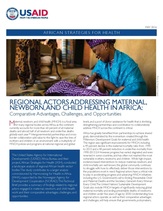
Regional Actors Addressing Maternal, Newborn, and Child Health in Africa: Comparative Advantages, Challenges and Opportunities
In recent years, there has been a growing trend toward regionalization on the African continent, as integrated and cooperative efforts have created positive impact in political, economic, and social sectors. Intergovernmental partnerships and cross-border collaboration add value to the fight to save the lives of mothers and children. In an environment with a multiplicity of MNCH policies and programs at national, regional, and global levels, and a pool of donor assistance for health that is shrinking, strengthening partnerships and coordination to collaboratively address MNCH across the continent is critical.
[Download Technical Brief]
[In French]
Visit the online database to browse through more than 120 regional organizations working in health in Africa. >>Database
In recent years, there has been a growing trend toward regionalization on the African continent, as integrated and cooperative efforts have created positive impact in political, economic, and social sectors. Intergovernmental partnerships and cross-border collaboration add value to the fight to save the lives of mothers and children. In an environment with a multiplicity of MNCH policies and programs at national, regional, and global levels, and a pool of donor assistance for health that is shrinking, strengthening partnerships and coordination to collaboratively address MNCH across the continent is critical.
[Download Technical Brief]
[In French]
Visit the online database to browse through more than 120 regional organizations working in health in Africa. >>Database
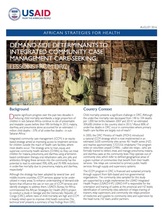
Demand-Side Determinants to Integrated Community Case Management Care-Seeking: Lessons from DRC
Integrated community case management (iCCM) is an effective, equity-based strategy that aims to train, equip, and supervise community health workers to treat children for malaria, diarrhea, and pneumonia. Despite the potential for iCCM services to lead to significant reductions in child mortality, its utilization by care-seekers remains low. This study was conducted in the Democratic Republic of Congo (DRC) and Senegal to enhance understanding of demand-side factors that influence the use or non-use of iCCM services and identify strategies to address them. Technical Brief [Download]
Full DRC Report [Download]
Technical Brief in French - Coming Soon!
Integrated community case management (iCCM) is an effective, equity-based strategy that aims to train, equip, and supervise community health workers to treat children for malaria, diarrhea, and pneumonia. Despite the potential for iCCM services to lead to significant reductions in child mortality, its utilization by care-seekers remains low. This study was conducted in the Democratic Republic of Congo (DRC) and Senegal to enhance understanding of demand-side factors that influence the use or non-use of iCCM services and identify strategies to address them. Technical Brief [Download]
Full DRC Report [Download]
Technical Brief in French - Coming Soon!
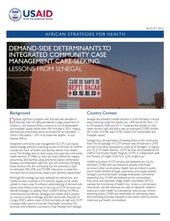
Demand-Side Determinants to Integrated Community Case Management Care-Seeking: Lessons from Senegal
Senegal has a long history of treating illness at the community level. The full package of iCCM services was introduced in 2003 and has since been expanded to cover all of Senegal’s 14 regions and 72 of 75 health districts. The aim of this study was to identify demand-side drivers of the use or non-use of iCCM services across four districts and eight community sites in Senegal. The findings and recommendations may be relevant for countries that are considering introducing, modifying, or scaling up an iCCM program at the community level.
Technical Brief [Download]
Full Senegal Report [Download]
Technical Brief in French - Coming Soon!
Senegal has a long history of treating illness at the community level. The full package of iCCM services was introduced in 2003 and has since been expanded to cover all of Senegal’s 14 regions and 72 of 75 health districts. The aim of this study was to identify demand-side drivers of the use or non-use of iCCM services across four districts and eight community sites in Senegal. The findings and recommendations may be relevant for countries that are considering introducing, modifying, or scaling up an iCCM program at the community level.
Technical Brief [Download]
Full Senegal Report [Download]
Technical Brief in French - Coming Soon!
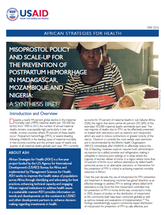
Misoprostol Policy and Scale-up for the Prevention of Postpartum Hemorrhage in Madagascar, Mozambique, and Nigeria: A Synthesis Brief
Postpartum hemorrhage (PPH) is the leading cause of maternal mortality in low-income countries. Over the past decade, the use of misoprostol for the prevention of PPH in developing countries has gained attention as an effective strategy in settings where skilled birth attendance is low, particularly at the community level. Despite a growing body of evidence, few countries in Africa have adopted national policies or service-delivery guidelines for the introduction and scale-up of this intervention. To better understand and inform the processes behind doing so, ASH conducted a review of experiences from Madagascar, Mozambique, and Nigeria. [Download Synthesis Brief]
Postpartum hemorrhage (PPH) is the leading cause of maternal mortality in low-income countries. Over the past decade, the use of misoprostol for the prevention of PPH in developing countries has gained attention as an effective strategy in settings where skilled birth attendance is low, particularly at the community level. Despite a growing body of evidence, few countries in Africa have adopted national policies or service-delivery guidelines for the introduction and scale-up of this intervention. To better understand and inform the processes behind doing so, ASH conducted a review of experiences from Madagascar, Mozambique, and Nigeria. [Download Synthesis Brief]
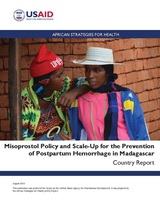
Misoprostol Policy and Scale-up for the Prevention of Postpartum Hemorrhage in Madagascar: Country Report
This study identifies a number of facilitators, enablers, and challenges in Madagascar’s support for community distribution of misoprostol for the prevention of PPH and its subsequent implementation. While no formal policy has been established, gains in policy adoption are reflected in a ministerial note, which authorizes the procurement and roll-out of misoprostol at the community level for the prevention of PPH. [Download]
This study identifies a number of facilitators, enablers, and challenges in Madagascar’s support for community distribution of misoprostol for the prevention of PPH and its subsequent implementation. While no formal policy has been established, gains in policy adoption are reflected in a ministerial note, which authorizes the procurement and roll-out of misoprostol at the community level for the prevention of PPH. [Download]
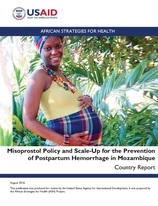
Misoprostol Policy and Scale-up for the Prevention of Postpartum Hemorrhage in Mozambique: Country Report
A range of factors were cited as influential in the development, adoption, and subsequent implementation of Mozambique’s policy for community-based distribution of misoprostol for PPH. A critical determinant was cited as the engagement and leadership from the MOH. However, government support alone was not sufficient for policy adoption; the availability of local research as well as broad-based support from national and international stakeholders was also important to bring about the necessary policy and regulatory decisions for the effective adoption and subsequent implementation of the policy. [Download]
A range of factors were cited as influential in the development, adoption, and subsequent implementation of Mozambique’s policy for community-based distribution of misoprostol for PPH. A critical determinant was cited as the engagement and leadership from the MOH. However, government support alone was not sufficient for policy adoption; the availability of local research as well as broad-based support from national and international stakeholders was also important to bring about the necessary policy and regulatory decisions for the effective adoption and subsequent implementation of the policy. [Download]
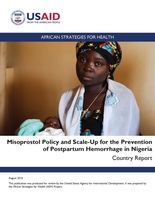
Misoprostol Policy and Scale-up for the Prevention of Postpartum Hemorrhage in Nigeria: Country Report
This study demonstrates that a number of facilitators, enablers, and challenges have contributed to Nigeria’s support for community distribution of misoprostol for PPH and its subsequent implementation. While the policy development process was described as long and arduous, a strong facilitator for its adoption was the availability of local evidence highlighting the safety, feasibility, and acceptability of this intervention in the most challenging areas of Nigeria. [Download]
This study demonstrates that a number of facilitators, enablers, and challenges have contributed to Nigeria’s support for community distribution of misoprostol for PPH and its subsequent implementation. While the policy development process was described as long and arduous, a strong facilitator for its adoption was the availability of local evidence highlighting the safety, feasibility, and acceptability of this intervention in the most challenging areas of Nigeria. [Download]
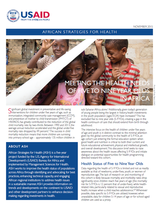
Meeting the Health Needs of Five to Nine Year Olds In Africa
Significant global investment in preventative and life-saving interventions for children under five years of age has greatly contributed to the reduction of the global mortality rate by nearly half from 1990 to 2013. Given that more children are surviving into primary school age and beyond, and that today’s generation of young people is the largest in history, health investments in the youth population (ages 10-24) have also increased. However, this investment often excludes five to nine year olds, creating a gap in the health continuum of care that should extend from birth through adulthood. This discussion brief aims to raise awareness about the health issues affecting five to nine year olds and initiating dialogue on potential opportunities for health programming directed toward this cohort. [Download]
Significant global investment in preventative and life-saving interventions for children under five years of age has greatly contributed to the reduction of the global mortality rate by nearly half from 1990 to 2013. Given that more children are surviving into primary school age and beyond, and that today’s generation of young people is the largest in history, health investments in the youth population (ages 10-24) have also increased. However, this investment often excludes five to nine year olds, creating a gap in the health continuum of care that should extend from birth through adulthood. This discussion brief aims to raise awareness about the health issues affecting five to nine year olds and initiating dialogue on potential opportunities for health programming directed toward this cohort. [Download]
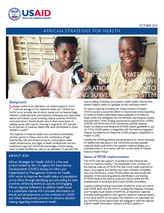
Maternal Death Surveillance and Response (MDSR) Case Studies
A 2011 Bulletin of the World Health Organization advocates for low-income countries to adopt maternal death surveillance and response (MDSR) systems that include maternal death identification, reporting, review, and response to provide the essential information to stimulate and guide actions to prevent future maternal deaths and improve the measurement of maternal mortality. To enhance cross-country learning around MDSR, ASH developed two country-specific case studies which document MDSR implementation experiences in Burkina Faso and Malawi. These case studies were developed for inclusion in the WHO Global MDSR Implementation Report and can be accessed on the WHO website.
Burkina Faso Case Study [Download]
Malawi Case Study [Download]
A 2011 Bulletin of the World Health Organization advocates for low-income countries to adopt maternal death surveillance and response (MDSR) systems that include maternal death identification, reporting, review, and response to provide the essential information to stimulate and guide actions to prevent future maternal deaths and improve the measurement of maternal mortality. To enhance cross-country learning around MDSR, ASH developed two country-specific case studies which document MDSR implementation experiences in Burkina Faso and Malawi. These case studies were developed for inclusion in the WHO Global MDSR Implementation Report and can be accessed on the WHO website.
Burkina Faso Case Study [Download]
Malawi Case Study [Download]
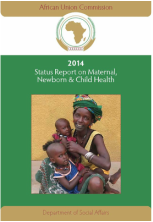
2014 Status Report on Maternal, Newborn and Child Health
Source: African Union Commission
As part of the African Union’s Campaign on Accelerated Reduction of Maternal Mortality in Africa (CARMMA), the African Union Commission launched the 2014 Status Report on Maternal and Child Health, at the 2015 CARMMA Week Commemoration held in Nairobi, Kenya on November 18-19, 2015. Developed with support from the African Strategies for Health project, the Status Report is part of the African Union's contribution to enhancing MNCH on the continent. This is the third in a series of Status Reports prepared since 2012. The report details the status of MNCH in Africa over the last five years and makes recommendations for focusing efforts on ending preventable maternal and child deaths by 2030. [Download]
Source: African Union Commission
As part of the African Union’s Campaign on Accelerated Reduction of Maternal Mortality in Africa (CARMMA), the African Union Commission launched the 2014 Status Report on Maternal and Child Health, at the 2015 CARMMA Week Commemoration held in Nairobi, Kenya on November 18-19, 2015. Developed with support from the African Strategies for Health project, the Status Report is part of the African Union's contribution to enhancing MNCH on the continent. This is the third in a series of Status Reports prepared since 2012. The report details the status of MNCH in Africa over the last five years and makes recommendations for focusing efforts on ending preventable maternal and child deaths by 2030. [Download]
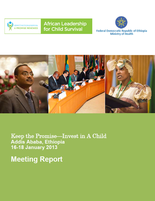
African Leadership for Child Survival Meeting Report
As part of Committing to Child Survival: A Promise Renewed, a global effort to stop children from dying of causes that are easily prevented, ASH supported the Government of Ethiopia, USAID and UNICEF to convene the African Leadership for Child Survival Call to Action meeting in Addis Ababa, Ethiopia, from January 16-18, 2013. The focus of the meeting was on:
UNICEF’s Committing to Child Survival: A Promise Renewed: 2013 Progress Report [Download] provides an update on global progress to date.
As part of Committing to Child Survival: A Promise Renewed, a global effort to stop children from dying of causes that are easily prevented, ASH supported the Government of Ethiopia, USAID and UNICEF to convene the African Leadership for Child Survival Call to Action meeting in Addis Ababa, Ethiopia, from January 16-18, 2013. The focus of the meeting was on:
- Scientific evidence for high impact interventions that can accelerate progress shared;
- Progress in achieving national Millennium Development Goals for child survival reviewed;
- Approaches (best practices) for scaling up high impact interventions for newborn and child health reviewed; and
- Galvanizing momentum for country led national Child Survival Action Plans.
UNICEF’s Committing to Child Survival: A Promise Renewed: 2013 Progress Report [Download] provides an update on global progress to date.